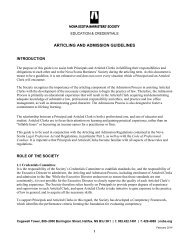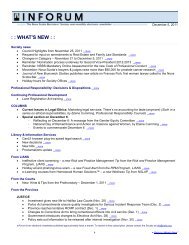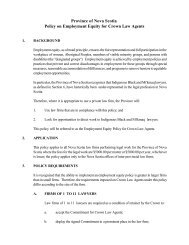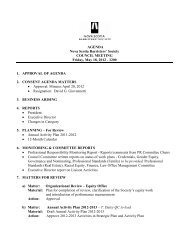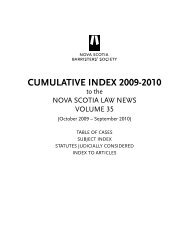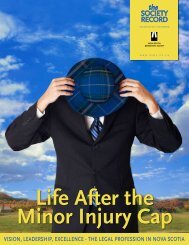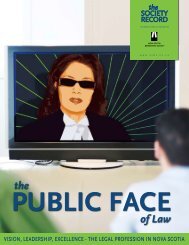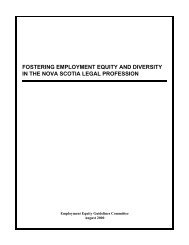SR Vol 25 No 1, January 2007 - Nova Scotia Barristers' Society
SR Vol 25 No 1, January 2007 - Nova Scotia Barristers' Society
SR Vol 25 No 1, January 2007 - Nova Scotia Barristers' Society
Create successful ePaper yourself
Turn your PDF publications into a flip-book with our unique Google optimized e-Paper software.
In short, pleadings, disclosure, and discovery are not necessary toenable adequate preparation for a hearing. Doing away with themenables the parties to have their hearing more quickly. It also meansthat the cost of legal representation, if it is chosen, is substantiallyless than would otherwise be the case. If delay and the expense oflegal representation are barriers to justice, then the Small ClaimsCourt’s approach clearly lowers both for the lay public.The way in which default proceedings are handled is anotherexample of how the Small Claims Court protects “the poor”against “the rich.” Default judgments in the Supreme Court aregranted without any review of the claim to determine whether ithas any merit. The process assumes that failure to appear or to filea defence represents an admission of liability. The assumption maybe appropriate in theory, but in practice it fails to acknowledge thatsome defendants fail to defend because they lack the knowledge toknow they have a defence, or the financial resources to mount one.This is not the approach in the Small Claims Court. There is no“default” judgment. Adjudicators must be satisfied that a claim hasmerit before granting judgment, even if the defendant fails to file adefence, or to appear for the hearing. 5 The system thereby providessome procedural protection to those too poor or too ignorant toadvance a meritorious defence – a protection that is not available inthe Supreme Court.Then there is the issue of party and party costs. Imagine a laylitigant in the Small Claims Court confronting a large corporationand its legal team, either as a claimant or as a defendant. They feelthey have a good claim or defence. They cannot afford a lawyer, butbelieve that if they are heard by a neutral decision maker they willwin. The only downside associated with loss in the Small ClaimsCourt is either the filing fee (if they are a claimant), or having to paya claim that in many cases they had at one point budgeted to pay. 6In such a case the litigant presses forward to have his or her day incourt.The risks are different (and far more oppressive) in the SupremeCourt. There the same lay litigant in the same case is told that heor she may have to pay a portion of the corporation’s legal costs ifthey lose. <strong>No</strong>w the corporation’s ability to pit a lawyer against anunrepresented litigant truly becomes oppressive. <strong>No</strong>w the fear ofhaving to pay party and party costs can cow a litigant into giving upa meritorious claim or defence.Finally, there is the fact that the Small Claims Court is the onlyforum that lay litigants have to enforce their rights under suchpieces of consumer protection legislation as the Consumer ProtectionAct and the Residential Tenancies Act. Such legislation is rarely, ifever, considered in the Supreme Court. But the rights designed tobe protected by them remain valueless if they cannot be enforcedbecause enforcement would cost too much and take too long.To conclude, extending the financial jurisdiction of the SmallClaims Court in fact increases the lay public’s access to justice. Itmakes it possible for ordinary people to get to court to enforce orprotect their rights. It also enables them to “do it themselves”, or toemploy lawyers without bankrupting themselves in the process.The suggestion that hearings ought to be transcribed is misguided.First, appeals from decisions in the Small Claims Court are basedon questions of law or denials of natural justice, not on fact. Havingtranscripts would add nothing to the appeal. Second, there is thequestion of the cost of obtaining the transcript. For many peoplewho find themselves in the Small Claims Court $500 is “a lot ofmoney”. Expecting them to come up with the cost of a preparingand then copying a transcript would only erect a barrier to theappeal process. A far better use of Legislative time and money wouldbe to improve the enforcement mechanisms of the Small ClaimsCourt or make legal advice available to lay litigants.Regarding the first point, lay litigants often experience difficultyenforcing their judgments. There is confusion and uncertainty overthe extent of the Small Claims Court’s ability to enforce its orders(for example, through a judgment debtor examination). To givelay people the right to sue in court but then deny them the abilityto enforce their judgments is to deny them access to justice. Suchconfusion and uncertainty ought to be rectified.Regarding the second point, for all the laudable informality of theSmall Claims Court process, adjudicators are still required to makedecisions based on “established principles of law”. Those principlesare not always understood by lay litigants. Providing a way to obtainlegal advice on those principles, and the evidence necessary to satisfythem, would be a far more useful expenditure of public funds thanthe recording of proceedings. It would also reduce the barriersotherwise created by the lay public’s ignorance of those “establishedprinciples”. (I am not suggesting here that the public purse be usedto fund legal representation; only that it fund the provision, say, ofan hour’s “free” advice.)Footnotes:1 See for example the comments in the Legislature ofKevin Deveaux and Graham Steele: Hansard, 20 Oct2005; and of Michel Samson: Hansard, 31 Oct 2005.2 My discussions with members of the bar; and seeKemp v. Presceskey 2006 NSSC 122; Surrette Battery Co.Ltd. v. McNutt 2003 NSSC 6.3 Section 28(1) of the Small Claims Court Act (the “Act”).4 Section 2 of the Act.5 See sections 23(1)(b) and 23(3) of the Act.6 I am thinking here of contract disputes, where thedefendant had initially agreed to pay a contract price(and so had notionally budgeted for that expense)but only later disputed liability to pay because of aperceived breach of contract.36 The <strong>Society</strong> Record



